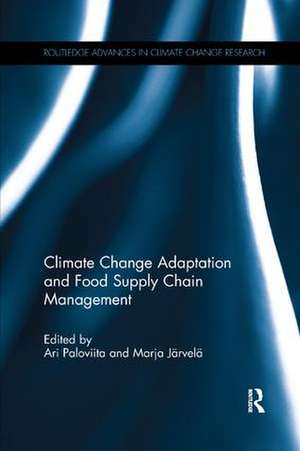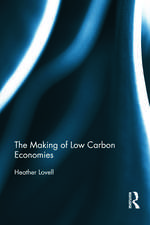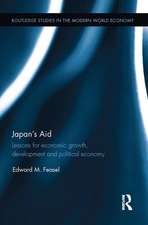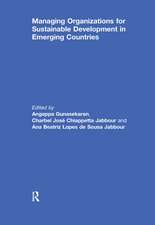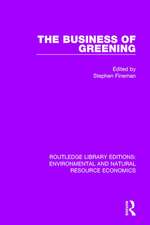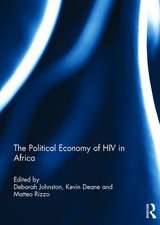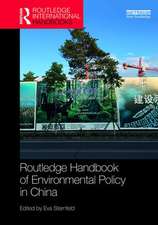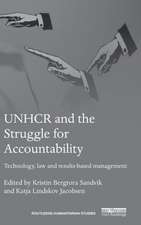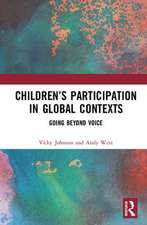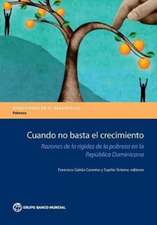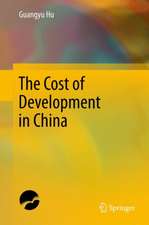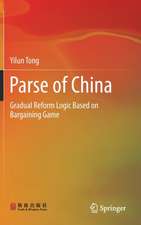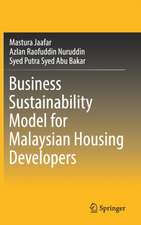Climate Change Adaptation and Food Supply Chain Management: Routledge Advances in Climate Change Research
Editat de Ari Paloviita, Marja Järveläen Limba Engleză Paperback – 25 mai 2017
Climate Change Adaptation and Food Supply Chain Management highlights the issue of adaptation to climate change in food supply chains, the management and policy implications and the importance of supply chain resilience. Attention is given to each phase of the supply chain: input production, agriculture, food processing, retailing, consumption and post-consumption. European case studies demonstrate the vulnerabilities of contemporary food supply chains, the opportunities and competitive advantages related to climate change, and the trans-disciplinary challenges related to successful climate adaptation. The authors argue for a redefinition of the way food supply chains are operated, located and coordinated and propose a novel approach enhancing climate-resilient food supply chain policy and management.
This book will be of interest to students, researchers, practitioners and policymakers in the field of climate adaptation and food supply chain management and policy.
| Toate formatele și edițiile | Preț | Express |
|---|---|---|
| Paperback (1) | 449.41 lei 6-8 săpt. | |
| Taylor & Francis – 25 mai 2017 | 449.41 lei 6-8 săpt. | |
| Hardback (1) | 1054.71 lei 6-8 săpt. | |
| Taylor & Francis – 24 aug 2015 | 1054.71 lei 6-8 săpt. |
Din seria Routledge Advances in Climate Change Research
-
 Preț: 152.55 lei
Preț: 152.55 lei -
 Preț: 311.14 lei
Preț: 311.14 lei -
 Preț: 280.92 lei
Preț: 280.92 lei - 8%
 Preț: 376.64 lei
Preț: 376.64 lei -
 Preț: 310.75 lei
Preț: 310.75 lei -
 Preț: 207.00 lei
Preț: 207.00 lei -
 Preț: 309.87 lei
Preț: 309.87 lei -
 Preț: 320.22 lei
Preț: 320.22 lei -
 Preț: 312.54 lei
Preț: 312.54 lei -
 Preț: 310.14 lei
Preț: 310.14 lei - 8%
 Preț: 390.79 lei
Preț: 390.79 lei -
 Preț: 287.02 lei
Preț: 287.02 lei -
 Preț: 296.73 lei
Preț: 296.73 lei -
 Preț: 482.62 lei
Preț: 482.62 lei -
 Preț: 406.42 lei
Preț: 406.42 lei -
 Preț: 478.77 lei
Preț: 478.77 lei - 18%
 Preț: 1000.27 lei
Preț: 1000.27 lei -
 Preț: 449.41 lei
Preț: 449.41 lei -
 Preț: 449.41 lei
Preț: 449.41 lei - 12%
 Preț: 325.34 lei
Preț: 325.34 lei - 18%
 Preț: 1172.58 lei
Preț: 1172.58 lei - 18%
 Preț: 1001.84 lei
Preț: 1001.84 lei - 18%
 Preț: 1074.44 lei
Preț: 1074.44 lei -
 Preț: 408.16 lei
Preț: 408.16 lei - 31%
 Preț: 762.58 lei
Preț: 762.58 lei -
 Preț: 408.74 lei
Preț: 408.74 lei -
 Preț: 299.52 lei
Preț: 299.52 lei - 18%
 Preț: 701.56 lei
Preț: 701.56 lei - 28%
 Preț: 820.32 lei
Preț: 820.32 lei - 18%
 Preț: 1057.09 lei
Preț: 1057.09 lei - 18%
 Preț: 1055.51 lei
Preț: 1055.51 lei - 18%
 Preț: 1053.92 lei
Preț: 1053.92 lei -
 Preț: 416.22 lei
Preț: 416.22 lei - 18%
 Preț: 1053.16 lei
Preț: 1053.16 lei - 30%
 Preț: 847.73 lei
Preț: 847.73 lei - 25%
 Preț: 851.82 lei
Preț: 851.82 lei -
 Preț: 413.94 lei
Preț: 413.94 lei - 18%
 Preț: 1000.27 lei
Preț: 1000.27 lei - 18%
 Preț: 1226.79 lei
Preț: 1226.79 lei -
 Preț: 449.41 lei
Preț: 449.41 lei - 18%
 Preț: 1062.16 lei
Preț: 1062.16 lei - 26%
 Preț: 764.20 lei
Preț: 764.20 lei
Preț: 449.41 lei
Nou
Puncte Express: 674
Preț estimativ în valută:
85.99€ • 89.78$ • 71.17£
85.99€ • 89.78$ • 71.17£
Carte tipărită la comandă
Livrare economică 04-18 aprilie
Preluare comenzi: 021 569.72.76
Specificații
ISBN-13: 9781138104167
ISBN-10: 1138104167
Pagini: 212
Dimensiuni: 156 x 234 mm
Greutate: 0.45 kg
Ediția:1
Editura: Taylor & Francis
Colecția Routledge
Seria Routledge Advances in Climate Change Research
Locul publicării:Oxford, United Kingdom
ISBN-10: 1138104167
Pagini: 212
Dimensiuni: 156 x 234 mm
Greutate: 0.45 kg
Ediția:1
Editura: Taylor & Francis
Colecția Routledge
Seria Routledge Advances in Climate Change Research
Locul publicării:Oxford, United Kingdom
Public țintă
PostgraduateCuprins
1 Climate Change Adaptation and Food Supply Chain Management: An Overview Part I Food Supply Chains: Actors, Products and Relationships 2. Climate Change and Food Security: Three Case Studies on Uncertainty 3. Building Resilient Food Supply Chains for the Future 4. Making Sense of Resilience in Barley Breeding: Converting the Concept of Response Diversity into a Tool of Reflection and Decision-Making Part II Local vs. Regional Vulnerabilities and Opportunities 5. Vulnerability to Climate Change in Food Systems: Challenges in Assessment Methodologies 6. Food Security During Climate Change: The Challenge of European Diversity 7. Climate Change, Vulnerability and Local Adaptation Strategies of Food Enterprises in Finland 8. Carbon Footprinting – The Clearest Way to Create a Climate-Friendly Food Consumption and Food Chain Part III Sustainable Livelihood, Community and Farm Resilience 9. Good Farmers, Good Adapters? How a Cultural Understanding of Good Farming Affects the Adaptive Capacity of Farmers? 10. Framing Resilience in Relation to Territorialization 11. Balancing Climate Change Mitigation and Adaptation with the Socio-Economic Goals of Farms in Northern Europe 12. Coping with Climate Change: Rural Livelihoods, Vulnerabilities and Farm Resilience Part IV Climate-Resilient Supply Chain Management - Upstream and Downstream 13. Managing Food Systems for Resilience 14. Citizens and Sustainable Culinary Cultures 15. Food Waste and Related Climate Impacts in Finland 16. Food Processing Companies, Retailers and Climate-Resilient Supply Chain Management
Descriere
Climate Change Adaptation and Food Supply Chain Management highlights the issue of adaptation to climate change in food supply chains, the management and policy implications and the importance of supply chain resilience. Attention is given to each phase of the supply chain: input production, agriculture, food processing, retailing, consumption and post-consumption. European case studies demonstrate the vulnerabilities of contemporary food supply chains, the opportunities and competitive advantages related to climate change, and the trans-disciplinary challenges related to successful climate adaptation. The authors argue for a redefinition of the way food supply chains are operated, located and coordinated and propose a novel approach enhancing climate-resilient food supply chain policy and management.
